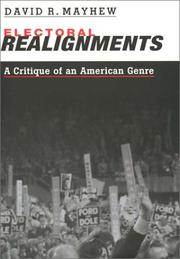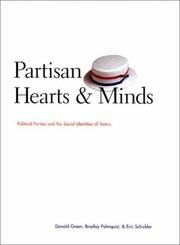| Listing 1 - 10 of 44 | << page >> |
Sort by
|
Book
ISBN: 0191600164 9786611981259 1281981257 9780191600166 Year: 1996 Publisher: Oxford ; New York : Oxford University Press,
Abstract | Keywords | Export | Availability | Bookmark
 Loading...
Loading...Choose an application
- Reference Manager
- EndNote
- RefWorks (Direct export to RefWorks)
An investigation into changing relations between parties and their members in four major British and German political parties. By calling attention to the benefits members can provide for parties even in a mass-media age, this account helps to explain why some party leaders have been willing to back recent expansions of intra-party democracy.
Political parties --- Party affiliation --- Affiliation, Party --- Political affiliation --- Membership
Book
ISBN: 1108754589 1108683703 1108750958 1108497004 1108739407 9781108750950 9781108754583 9781108683708 Year: 2019 Publisher: Cambridge, England : Cambridge University Press,
Abstract | Keywords | Export | Availability | Bookmark
 Loading...
Loading...Choose an application
- Reference Manager
- EndNote
- RefWorks (Direct export to RefWorks)
Calvo and Murillo consider the non-policy benefits that voters consider when deciding their vote. While parties advertise policies, they also deliver non-policy benefits in the form of competent economic management, constituency service, and patronage jobs. Different from much of the existing research, which focuses on the implementation of policy or on the delivery of clientelistic benefits, this book provides a unified view of how politicians deliver broad portfolios of policy and non-policy benefits to their constituency. The authors' theory shows how these non-policy resources also shape parties' ideological positions and which type of electoral offers they target to poorer or richer voters. With exhaustive empirical work, both qualitative and quantitative, the research documents how linkages between parties and voters shape the delivery of non-policy benefits in Argentina and Chile.
Party affiliation --- Political parties --- Political participation --- Affiliation, Party --- Political affiliation --- Membership --- Political parties.
Book
ISBN: 0190623918 Year: 2018 Publisher: New York, NY : Oxford University Press,
Abstract | Keywords | Export | Availability | Bookmark
 Loading...
Loading...Choose an application
- Reference Manager
- EndNote
- RefWorks (Direct export to RefWorks)
'Ideology and Identity' shows that party politics and elections in India are a contest of ideas. Using survey data from the Indian National Election Studies (NES) and survey experiments from smaller but more focused studies, the text shows that Indian electoral politics, as represented by political parties, their members, and their voters, is in fact marked by deep ideological cleavages.
Political parties --- Party affiliation --- Elections --- Political culture --- India --- Politics and government --- Culture --- Political science --- Affiliation, Party --- Political affiliation --- Membership
Book
ISBN: 0197630731 0197630715 0197630723 Year: 2022 Publisher: New York, NY : Oxford University Press,
Abstract | Keywords | Export | Availability | Bookmark
 Loading...
Loading...Choose an application
- Reference Manager
- EndNote
- RefWorks (Direct export to RefWorks)
What motivates citizens to support one party over the other? Do they carefully weigh all the relevant issues and assess which party or candidate best matches their own positions? Or do people look at politics as something more akin to a team sport-the specifics do not matter as long as you know what side your team is on? Understanding how and why Americans vote the way they do is central to understanding the political process. Political Choice in a Polarized America claims that individuals have core beliefs about what the government should or should not do, and these attitudes explain a great deal about what party a person identifies with and votes for. Moreover, the book demonstrates these attitudes' explanatory power has increased in recent decades. Its thesis rests on the idea that voters generally try to support the party or candidate that best matches their orientations. However, voters' ability to successfully do so varies as a function of the signals sent by elites. Voters have an easier time connecting their own orientations with the party offerings when the parties are polarized. As a result, voters' policy attitudes explain a lot more about their partisan preferences than they did in previous eras. When the parties are polarized, people notice, even if they do not place close attention to politics. The result is an electorate divided by partisanship, policy, and ideology.
Elite (Social sciences) --- Party affiliation --- Polarization (Social sciences) --- Political activity --- Affiliation, Party --- Political affiliation --- Political parties --- Membership

ISBN: 1281722294 9786611722296 0300130031 9780300130034 9780300093360 0300093365 9781281722294 6611722297 Year: 2002 Publisher: New Haven, CT Yale University Press
Abstract | Keywords | Export | Availability | Bookmark
 Loading...
Loading...Choose an application
- Reference Manager
- EndNote
- RefWorks (Direct export to RefWorks)
The study of electoral realignments is one of the most influential and intellectually stimulating enterprises undertaken by American political scientists. Realignment theory has been seen as a science able to predict changes, and generations of students, journalists, pundits, and political scientists have been trained to be on the lookout for "signs" of new electoral realignments. Now a major political scientist argues that the essential claims of realignment theory are wrong-that American elections, parties, and policymaking are not (and never were) reconfigured according to the realignment calendar. David Mayhew examines fifteen key empirical claims of realignment theory in detail and shows us why each in turn does not hold up under scrutiny. It is time, he insists, to open the field to new ideas. We might, for example, adopt a more nominalistic, skeptical way of thinking about American elections that highlights contingency, short-term election strategies, and valence issues. Or we might examine such broad topics as bellicosity in early American history, or racial questions in much of our electoral history. But we must move on from an old orthodoxy and failed model of illumination.

ISBN: 1281731102 9786611731106 030013200X 9780300132007 9781281731104 0300092156 9780300092158 0300101562 9780300101560 Year: 2002 Publisher: New Haven London
Abstract | Keywords | Export | Availability | Bookmark
 Loading...
Loading...Choose an application
- Reference Manager
- EndNote
- RefWorks (Direct export to RefWorks)
In this, the first major treatment of party identification in twenty years, three political scientists assert that identification with political parties still powerfully determines how citizens look at politics and cast their ballots. Challenging prevailing views, they build a case for the continuing theoretical and political significance of partisan identities.The authors maintain that individuals form partisan attachments early in adulthood and that these political identities, much like religious identities, tend to persist or change only slowly over time. Scandals, recessions, and landslide elections do not greatly affect party identification; large shifts in party attachments occur only when the social imagery of a party changes, as when African Americans became part of the Democratic Party in the South after the passage of the Voting Rights Act. Drawing on a wealth of data analysis using individual-level and aggregate survey data from the United States and abroad, this study offers a new perspective on party identification that will set the terms of discussion for years to come.
Party affiliation. --- Voting. --- Party affiliation --- Voting --- Polls --- Elections --- Politics, Practical --- Social choice --- Suffrage --- Affiliation, Party --- Political affiliation --- Political parties --- Membership --- Balloting

ISBN: 0198279183 Year: 1995 Publisher: New York : Oxford University Press,
Abstract | Keywords | Export | Availability | Bookmark
 Loading...
Loading...Choose an application
- Reference Manager
- EndNote
- RefWorks (Direct export to RefWorks)
Political parties --- Party affiliation --- Partis politiques --- Adhésion --- #SBIB:324H43 --- #SBIB:328H213 --- #SBIB:328H214 --- #SBIB:AANKOOP --- Affiliation, Party --- Political affiliation --- Politieke structuren: politieke partijen --- Instellingen en beleid: Bondsrepubliek Duitsland --- Instellingen en beleid: Verenigd Koninkrijk --- Membership
Book
ISBN: 1316496368 1316496694 1316498670 131649702X 113968356X 1316497356 110707360X 1107423201 1316494381 Year: 2016 Publisher: Cambridge : Cambridge University Press,
Abstract | Keywords | Export | Availability | Bookmark
 Loading...
Loading...Choose an application
- Reference Manager
- EndNote
- RefWorks (Direct export to RefWorks)
Why have so many established political parties across Latin America collapsed in recent years? Party Brands in Crisis offers an explanation that highlights the effect of elite actions on voter behavior. During the 1980s and 1990s, political elites across the region implemented policies inconsistent with the traditional positions of their party, provoked internal party conflicts, and formed strange-bedfellow alliances with traditional rivals. These actions diluted party brands and eroded voter attachment. Without the assured support of a partisan base, parties became more susceptible to short-term retrospective voting, and voters without party attachments deserted incumbent parties when they performed poorly. Party Brands in Crisis offers the first general explanation of party breakdown in Latin America; it reinforces the interaction between elite behavior and mass attitudes.
Political parties --- Party affiliation --- Party discipline --- Representative government and representation --- Affiliation, Party --- Political affiliation --- Discipline --- Membership --- Latin America --- Asociación Latinoamericana de Libre Comercio countries --- Neotropical region --- Neotropics --- New World tropics --- Spanish America --- Politics and government
Book
ISBN: 1108105882 1108109977 1108110657 1316601404 1316550567 1108111335 1108114733 1108112013 1107145945 1108114059 Year: 2016 Publisher: New York : Cambridge University Press,
Abstract | Keywords | Export | Availability | Bookmark
 Loading...
Loading...Choose an application
- Reference Manager
- EndNote
- RefWorks (Direct export to RefWorks)
Nearly four decades since the onset of the third wave, political parties remain weak in Latin America: parties have collapsed in much of the region, and most new party-building efforts have failed. Why do some new parties succeed while most fail? This book challenges the widespread belief that democracy and elections naturally give rise to strong parties and argues that successful party-building is more likely to occur under conditions of intense conflict than under routine democracy. Periods of revolution, civil war, populist mobilization, or authoritarian repression crystallize partisan attachments, create incentives for organization-building, and generate a 'higher cause' that attracts committed activists. Empirically rich chapters cover diverse cases from across Latin America, including both successful and failed cases.
Political parties --- Party affiliation --- Affiliation, Party --- Political affiliation --- Membership --- Latin America --- Asociación Latinoamericana de Libre Comercio countries --- Neotropical region --- Neotropics --- New World tropics --- Spanish America --- Politics and government
Book
ISBN: 1108897339 110889450X 1108899048 1108841635 Year: 2021 Publisher: Cambridge, England : Cambridge University Press,
Abstract | Keywords | Export | Availability | Bookmark
 Loading...
Loading...Choose an application
- Reference Manager
- EndNote
- RefWorks (Direct export to RefWorks)
Political parties are taken for granted today, but how was the idea of party viewed in the eighteenth century, when core components of modern, representative politics were trialled? From Bolingbroke to Burke, political thinkers regarded party as a fundamental concept of politics, especially in the parliamentary system of Great Britain. The paradox of party was best formulated by David Hume: while parties often threatened the total dissolution of the government, they were also the source of life and vigour in modern politics. In the eighteenth century, party was usually understood as a set of flexible and evolving principles, associated with names and traditions, which categorised and managed political actors, voters, and commentators. Max Skjönsberg thus demonstrates that the idea of party as ideological unity is not purely a nineteenth- or twentieth-century phenomenon but can be traced to the eighteenth century.
Political parties --- Political culture --- Party affiliation --- Affiliation, Party --- Political affiliation --- Culture --- Political science --- Parties, Political --- Party systems, Political --- Political party systems --- Divided government --- Intra-party disagreements (Political parties) --- Political conventions --- History --- Membership --- Great Britain --- Politics and government
| Listing 1 - 10 of 44 | << page >> |
Sort by
|

 Search
Search Feedback
Feedback About UniCat
About UniCat  Help
Help News
News